Integrated cold chain logistics refers to the seamless coordination of temperature-sensitive products throughout the supply chain, from production to consumption. This approach is crucial for industries such as pharmaceuticals, food and beverage, and biotechnology, where maintaining specific temperature ranges is essential for product integrity and safety.
According to Statista, the size of the global cold chain logistics market as of 2022 was $248.4 billion! The benefits of integrated cold chain logistics are extensive, impacting efficiency, safety, and sustainability.
1. Product Quality and Safety
One of the most significant benefits of an integrated cold chain is the preservation of product quality. Perishable goods, such as fresh produce, dairy, and meat, require strict temperature control to prevent spoilage and contamination. An integrated system ensures that these products are maintained at optimal temperatures throughout the logistics process, reducing the risk of spoilage and extending shelf life. This not only helps companies avoid losses but also ensures that consumers receive safe, high-quality products.
2. Regulatory Compliance
Various industries are subject to stringent regulations regarding the storage and transportation of temperature-sensitive products. Integrated cold chain logistics systems are designed to comply with these regulations, ensuring that companies meet legal requirements and avoid penalties. Compliance with standards such as those set by the Food and Drug Administration (FDA) and the European Medicines Agency (EMA) can enhance a company’s reputation and increase consumer trust.
3. Reduced Waste
By maintaining the integrity of temperature-sensitive goods, integrated cold chain logistics significantly reduce waste. Spoiled products not only result in financial losses for businesses but also contribute to environmental concerns. A well-managed cold chain minimizes food waste and ensures that resources are used efficiently, aligning with global sustainability goals. This reduction in waste not only benefits the environment but also enhances profitability.
4. Enhanced Traceability
Integrated cold chain logistics often involve advanced tracking technologies, such as Internet of Things (IoT) devices, which allow real-time monitoring of temperature and location. This enhanced traceability is crucial for identifying any potential issues in the supply chain, such as temperature excursions or delays. When issues arise, companies can take swift action to rectify them, ensuring that products remain safe for consumption. Additionally, traceability supports transparency, allowing consumers to make informed choices about the products they purchase.
5. Improved Operational Efficiency
An integrated approach to cold chain logistics streamlines operations by coordinating all aspects of the supply chain, from storage to transportation. This coordination reduces delays and ensures that products are delivered on time. Efficient operations lead to cost savings, as companies can optimize their routes, manage inventory more effectively, and reduce energy consumption in storage and transportation. These efficiencies not only improve the bottom line but also contribute to better customer satisfaction.
6. Competitive Advantage
In today’s market, companies that can demonstrate their ability to manage an effective cold chain often gain a competitive advantage. Consumers are increasingly demanding transparency and quality in the products they purchase, particularly for perishable goods. By investing in integrated cold chain logistics, businesses can differentiate themselves from competitors who may struggle with product quality or regulatory compliance. This differentiation can lead to increased customer loyalty and market share.
7. Scalability and Flexibility
Integrated cold chain logistics systems are typically designed to be scalable and flexible, allowing businesses to adapt to changing demands. Whether a company is expanding its product line, entering new markets, or responding to seasonal fluctuations, a robust cold chain can support growth. This flexibility is crucial in a rapidly evolving market where consumer preferences and regulatory requirements can change quickly.
The benefits of integrated cold chain logistics extend beyond the immediate operational efficiencies and product quality assurances. By ensuring that temperature-sensitive products are managed effectively throughout the supply chain, companies can enhance safety, reduce waste, comply with regulations, and build consumer trust. In an increasingly competitive and environmentally conscious market, investing in integrated cold chain logistics is not just a logistical necessity but a strategic imperative that can drive business success. For more information on getting started with cold chain logistics in Singapore, don’t hesitate to reach out to Singapore Delivery Services today.


